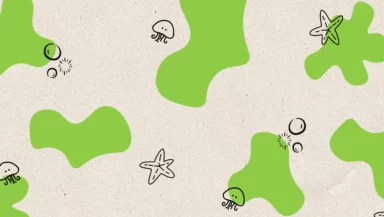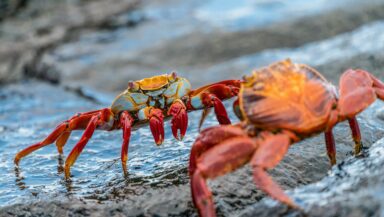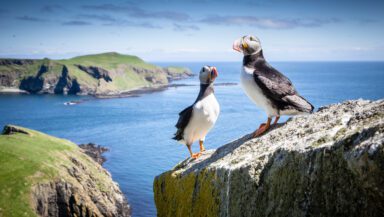Greenpeace UK’s plans to drop more boulders in the South West Deeps (East) Marine Protected Area to prevent industrial fishing have been blocked by the government overnight.
After Greenpeace UK announced yesterday their intention to load more boulders onto the ship Arctic Sunrise in Poole Quay to extend the barrier they created last week, the Marine Management Organisation (MMO) threatened Poole Harbour Commissioners with legal action if they allowed the boulders into port. The gates to Bulwark Quay where the ship is berthed were also locked this morning, and the haulage company transporting the boulders also received a legal threat.
Activists and crew had been preparing to return to the South West Deeps to extend the protective boulder barrier they created on 1 September to make it impossible for bottom-trawling to take place in one of the most heavily fished areas of the MPA. The area currently has no protection from fishing in place.
Bottom-trawling is a hugely destructive type of fishing that tears up marine habitats by dragging heavy nets across the seafloor. Extending the boulder barrier would have given further protection to one of the South West Deeps’ most heavily fished areas.
Will McCallum, Head of Oceans at Greenpeace UK, said: “The Marine Management Organisation has put an astonishing amount of energy into trying to stop marine protection. They are using intimidation tactics to block ocean defenders, while brazenly allowing industrial fishing vessels to destroy seabed habitats in our so-called Marine Protected Areas.
“The MMO is failing the UK’s small-scale fishermen. Their livelihoods are quickly becoming unviable; many are returning home with empty nets while huge factory boats scoop up all the fish in sight. It’s no wonder that two-thirds of our fish species are in decline.
“It’s clear that the government can act quickly when it wants to – so they have no excuse for their painstakingly slow approach to ocean protection. We stand by our demand that industrial fishing is banned in every UK Marine Protected Area, by adding a simple clause to commercial fishing licences. We won’t stop until our oceans are truly protected.”
ENDS
For more information or to arrange an interview, please contact Jasmine Watkiss, Press & Communications Officer (UK Oceans) at jasmine.watkiss@greenpeace.org / +447796 947448.
Notes to Editors
Photos
- Photos and video footage of Greenpeace UK’s boulder action in the South West Deeps (East) MPA on 1 September 2022 can be downloaded here.
Industrial fishing refers to:
- Supertrawlers, i.e. fishing vessels that are 100 metres long or more
- Bottom-towed fishing gear
- Fly-shooting
Fishing hours in the South West Deeps
- Fishing hours data for the South West Deeps (East) MPA is taken from Global Fishing Watch data
- Between 1 January 2021 and 15 July 2022, the South West Deeps (East) MPA was fished in for a total of 18,928 hours by 110 individual vessels
- Between 1 January 2021 and 15 July 2022, vessels with bottom-towed fishing gear spent 3,376.86 hours fishing in the South West Deeps (East) MPA
- “Bottom-trawling” refers to the following types of fishing gear:
- Bottom beam trawls
- Bottom otter trawls
- Scallopers and other bottom dredgers
- Fly-shooting
- Between 1 January 2021 and 15 July 2022, the following flagged vessels fished in the South West Deeps (East) MPA:
| FLAG | NUMBER OF VESSELS | % OF VESSELS IN SW DEEPS |
| France | 58 | 53% |
| Spain | 33 | 30% |
| Great Britain | 10 | 9% |
| Netherlands | 4 | 3% |
| Irish | 2 | 2% |
| Portugal | 1 | 1% |
| Germany | 1 | 1% |
| Denmark | 1 | 1% |
| TOTAL | 110 | 100% |
About the South West Deeps (East) MPA
- The South West Deeps (East) is a Marine Conservation Zone straddling the Western Channel and Celtic Sea, located roughly 190km south-west of Land’s End in Cornwall. The site covers an area of more than 4,600 km2 – which is bigger than Cornwall itself – and reaches depths of 750m.
- The Marine Conservation Society has done research on the South West Deeps, revealing that the habitat and the species that live there have been gravely affected by decades of industrial fishing. The beam trawling that takes place here erodes, uproots and crashes into species that are damaged by physical contact. For thousands of years, these species have evolved to grow slowly in a relatively stable environment and cannot withstand the destructive effect of seabed trawls. The area also stores 1.67 Mt of carbon – equivalent to carbon emissions from 1,007,058 return flights from London to Sydney – so it is really important to stop disturbing the sea bed and releasing carbon emissions. There is also a huge amount of pelagic fishing fleets and long-liners that target large fish near the surface.



